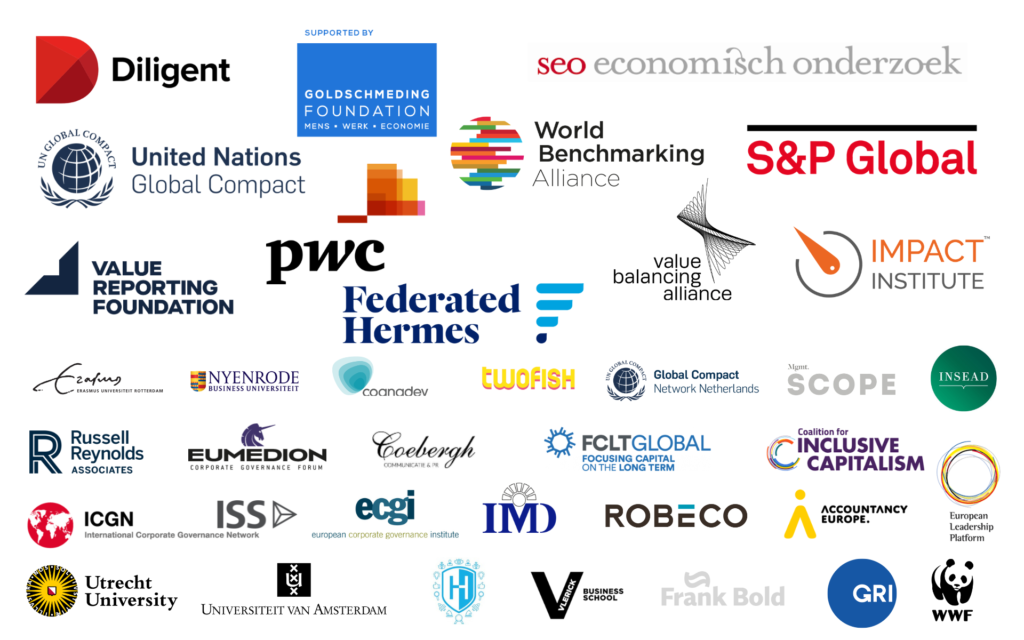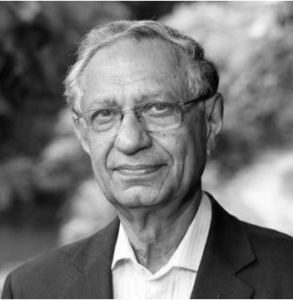Modernizing executive pay is a systemic change that requires the involvement, input and support of all relevant stakeholders. We aim for active participation and input from stakeholders with diverse perspectives and interests.
Modernizing executive pay is a systemic change that requires the involvement, input and support of all relevant stakeholders. We aim for active participation and input from stakeholders with diverse perspectives and interests.

Reward Value has included representatives of our stakeholder groups in its advisory council. In this way, the relevant stakeholder groups stay involved and a permanent exchange of knowledge takes place. This also promotes the desired implementation of the research results in practice.
The Principles of Responsible Remuneration (PRR) offer a framework for accelerating sustainable business performance and purposeful executive behaviour. By becoming a signatory to the Principles your organisation confirms its endorsement of the Principles and expresses the ambition to implement them.

Andre is a businessman, environmentalist, and philanthropist, and a passionate advocate for business as a force for good.
André is Vice Chairman of Roche Holding AG, the family business. He also sits on the Board of SystemIQ, the Board of Trustees of the World Economic Forum, and the Center for the Fourth Industrial Revolution.
André also has a distinguished career in nature conservation and sustainability. He is the President of the MAVA Foundation, and also of Fondation Tour du Valat. He is also Chairman of the Advisory Board of the Hoffmann Global Institute in Business and Society at INSEAD.

“How executives are incentivised and rewarded has a significant impact. We want to see executive pay that is simple, long-term and aligned to the desired culture and strategy of the organisation. We are concerned about pay practices around the world that generate ever-increasing quantum and risk driving short-term behaviour and poor practices.”
Amy Wilson, Regional Team Lead for Europe, EOS at Federated Hermes. EOS Federated Hermes is one of the world’s largest, specialist stewardship teams, representing long-term investors from around the world with assets of over $1.5 trillion (as at June 2021).
Amy Wilson leads the European engagement team at EOS and engages with companies across the region, focused on the consumer goods, retail, pharmaceutical and industrials sectors, and thematic areas across the ESG spectrum. In recent years, she has led the development of EOS’ global governance guidelines and proxy voting policies and its work on executive remuneration.
Amy has over 10 years of industry experience prior to joining Federated Hermes. She began her career in consultancy before holding various positions at publicly-listed UK retailer J Sainsbury and, latterly, global health insurer, Bupa, where she was Group Head of Corporate Responsibility and Sustainability. She holds a degree in Social and Political Sciences from the University of Cambridge.

Reward Value contributes to an evidence-based discussion about performance measurement and remuneration which will benefit both firms, shareholders and society at large.
Bas ter Weel is managing director of SEO Amsterdam Economics and a professor of economics at the University of Amsterdam. He has many years of experience as a scientist, policy researcher, supervisor, and advisor. His expertise lies in the field of labour market dynamics and education, but he has also contributed to the fields of international relations and financial markets regulation. He is based in Amsterdam.
Ter Weel studied Economics at Maastricht University (1993-1998) and obtained his PhD at the same university in 2002. Following this, he spent several years working as a university professor, after which he transferred to the Authority for the Financial Markets (AFM). With the AFM, Ter Weel gained supervisory experience and has worked on research in the field of market abuse and excessive lending. From the end of 2007, he has worked with the CPB Netherlands Bureau for Economic Policy Analysis as Head of International Economy (2007-2010), Head of Labour and Education (2010-2013), and as Deputy Director from 2013 onwards. In the period between 2007 and his appointment with SEO, he was affiliated part-time with Maastricht University; first as a senior researcher, and from 2011 onwards as professor of economics.
In addition to his work with SEO, Ter Weel holds several other positions. To name a few, he is a Crown-appointed member of the Social and Economic Council of the Netherlands (SER), supervisor for the primary school organisation, board member of the Royal Netherlands Economics Association, and co-editor of De Economist. Additionally, he is a research fellow at the Tinbergen Institute, IZA (University of Bonn) and SKOPE (Oxford University).

Reward Value shows that executive compensation is an important instrument in the hands of the Supervisory Board to drive the behavior of the Board, align it to the strategy and support the culture of the company.
Caroline Zegers is a thought leader in the field of Executive Compensation. She advises supervisory and management boards on remuneration, regulations and governance. In recent years, the connection with the sustainability goals has been central in this advice. She assists in designing clear and measurable ESG (Environmental, social and governance) KPI’s. In this way she contributes to a more sustainable business, where financial results as such are no longer sufficient to be rewarded.
For the past 30 years, she has been working for Deloitte , of which 23 years as a partner. High-quality service to clients has always been her priority. Next to being an advisor on executive and equity compensation to large (listed) companies, she took the opportunity within Deloitte to develop the Supervisory Board and Executive Women programs. In that context, she organizes various events, interviews board members and develops high-quality (in-house) courses on themes with great relevance to the Boardroom. Sustainability, including diversity & inclusion, has been a regular topic of discussion there. She brings along a large network of (female) board members and supervisory board members.
In addition to her work with Deloitte, she also holds and has held various (advisory) board positions for example with the Nederlandse Orde van Belastingadviseurs, the Stichting Dress for Success, One Young Word, the Stichting Toezicht Ledenobligaties-vrij FrieslandCampina and Female Ventures.

A sustainable reward system stimulates long term value creation for all stakeholders: clients, employees, suppliers, shareholders and the communities in which we live and operate. A sustainable reward system not only creates wealth but also needs to stimulate the creation of well-being for the society at large.
My name is Gilbert Van Hassel I am 64 and married to Viviane. I have three adult children who all live in New York and I have a 1 year old grandson called Theodore. Since September 2016 I am Chairman and CEO of Robeco. Before I was a Member of the Board of ING Insurance and Asset Management and the CEO of ING’s Investment Management business. The first 25 years of my career I spent with JP Morgan in various leadership roles. I spent 1/3 of my professional life in Europe, 1/3 in Asia and 1/3 in the USA. I studied applied economics at UFSIA (University of Antwerp), obtained a MBA from the Catholic University of Louvain and became a MS of Finance at Purdue University (USA).
Nature, diversity, integrity have always been very important to me but I truly became an ESG convert when I joined Robeco. At Robeco we believe that understanding and integrating ESG factors in our investment process in the long run will lead to better risk adjusted returns. We strongly feel that our fiduciary responsibility is not only to create wealth but equally to make sure that we also contribute to well-being.
The covid-19 crisis and the almost inevitably following economic crisis has shone an even bigger light on ESG. To rise above this crisis we will need to move to a sustainable recovery/economy. A world where we take care of our planet, climate and biodiversity. A world where people get equal opportunities and where human rights are respected. And all this with good local, national and corporate governance.
A sustainable economy needs a sustainable reward framework. Not one where we stimulate leaders to optimize the next quarter’s results nor to maximize only shareholder value. A sustainable reward system stimulates long term value creation for all stakeholders: clients, employees, suppliers, shareholders and the communities in which we live and operate. A sustainable reward system not only creates wealth but also needs to stimulate the creation of well-being for the society at large. That is why ESG kpis are important to evaluate the success of leaders. This I truly believe.

Ravi Chaudhry is an author, speaker, and a transformational coach to CEOs, corporate Boards and family enterprises, on “Shape your Future before it Shapes you”. A former Chairman of Tata Group companies, and Founder Chairman of Cenext Consulting Group, he regularly leads Board dialogues and workshops to empower the leadership teams to acknowledge the new realities and, break out of the gravitational pull of the past beliefs and prejudices. He engages you in a heart-to-heart conversation to help you discover your dormant strengths to be the “best of you”, and lead you on a journey from the ‘leadership base camp’ to the ‘Summit of Exceptional Leadership’.
Referred to as a leadership guru, his book, Quest for Exceptional Leadership: Mirage to Reality, where he introduces the concept of “720 degree Leadership”, has been globally acclaimed as a “contemporary masterpiece, a rare combination of sound business thinking and accessible philosophy, and the best book on leadership in years.” He is presently writing a new book on issues relating to ‘Reinventing Capitalism and Democracy’.
He is a steward of the Council for Inclusive Capitalism, a Fellow of World Business Academy, an Ambassador of Knowledge, Co-Chair, EthicMark Judges Panel USA, and a Fellow of Salzburg Global Seminar.

Karl Schmedders is Professor of Finance at IMD Lausanne, an independent academic institution with Swiss roots and global reach. He teaches executive management sessions in data science, the economics of climate change, and finance. Karl has published numerous research articles in international academic journals such as Econometrica, The Review of Economic Studies, The Journal of Finance, the Journal of Financial Economics, and The Review of Financial Studies, among others. Besides this, Karl is the co-founder of an EdTech startup – Sylva AG – which provides educators and students with a modern interactive learning and assessment environment.

“Performance pay usually makes people run too fast in the wrong direction. Time for fairness and decency”
Kees Cools is a Fellow of the Department of Public Governance at Tilburg University. Besides he is a management consultant with extensive experience in the field of corporate finance and corporate governance. He also wrote the book ‘Controle is goed, vertrouwen is beter‘ which won a prize for management book of the year. Previously Kees was partner at consultants including The Boston Consulting Group and Booz & Company resp. Strategy&-PwC.
He is a regular guest on live BNR programs such as Economists Panel and Boardroom Panel, a member of study society Economic Politics and a member of the supervisory board at CentERdata.

Managing Director, Research Strategist at FCLT Global.
Matthew Leatherman joined FCLT Global from North Carolina Department of State Treasurer where he served as Policy Director. He also was staff director of the Department’s Corporate Governance Committee.
Matthew’s earlier career focused on U.S. fiscal research, most recently at the Stimson Center in Washington D.C. His commentary in outlets like Bloomberg Government was influential for understanding government shutdown and budget sequestration the terms of fiscal impact, management process, and the governance relationship between executive and legislative branches. Matthew advised the Rivlin-Domenici Debt Reduction Commission on military budgeting and management, including the structure of retirement and health care benefits for U.S. service-members. His fiscal research has been published by Foreign Affairs, International Herald Tribune, Washington Post, McClatchy-Tribune News Service, and other outlets.
Matthew is a Board member of the John Rex Endowment, a $75 million fund with a focus on improving mental health, preventing injury, and expanding access to healthy lifestyles for children in Wake County (NC). He is a term member of the Council on Foreign Relations and holds degrees from the University of North Carolina and Columbia University.

I strongly believe that it is in the best long-term interest of society, companies and their leaders that companies are lead both profitably and sustainably. That requires not only selecting board members and executives with relevant sustainability expertise, but also rewarding and training them appropriately. Reward Value is a premier thought leader in the area of long-term rewards, so I am delighted to help them in any way I can.
Hans Reus is a core member of Russell Reynolds’ Technology Practice and previously co-lead its global Business and Professional Services Practice. As a trusted client advisor, he helps global, European and Dutch clients identify, assess, appoint and retain top-tier executives and non-executives. Hans also co-leads the firm’s activities regarding sustainable leadership, guiding clients as they build growing, profitable businesses in line with the Sustainable Development Goals.
Prior to joining Russell Reynolds Associates, Hans worked for six years with consulting firm McKinsey & Company. He managed strategy, organization, post-merger integration and cost-reduction projects in various industries, including information technology and renewable energy, both in the Netherlands and in Sweden. Previously, Hans worked with technology companies KPN Telecom and Raychem.
Hans received his MSc in electrical engineering from Delft University of Technology in the Netherlands and his MBA from INSEAD, Fontainebleau, in France. He is fluent in Dutch and English and has a working knowledge of French and German.

“Reward Value provides an essential role in reinforcing the connection between performance, corporate decision makers, investors and societal stakeholders supporting the drive towards effective remuneration policies linked to reducing short termism and focusing on social purpose”
Richard has over 20 years of specialised government relations experience in Brussels across the enterprise, sustainability and financial services sector working in partnership with the European Institutions. Richard is Managing Director of Cultivate Partners, a Brussels based consultancy with global coverage. He is currently a member of the Business 20 (B20) Indonesia Taskforce on sustainability. This is the official G20 dialogue forum with the business community.
Previously Richard was the EU Public Policy Lead of the World Benchmarking Alliance, a global non-profit bringing together investors, NGOs, business platforms and standards bodies to develop free and publicly available benchmarks that rank companies on their contribution to the SDGs. Through this work Richard engaged with European and multilateral partners at the highest level (including governments and the UN) to advocate for the full integration of financial and sustainability disclosure in company reporting to shape the direction of European Sustainability Reporting Standards. During this time he was appointed to the UN Financing for Development Sub-group on Sustainability and Climate Action to support work on how the SDGs ccould inform the jurisdictional, regional and global dimensions of sustainability disclosure.
In a career spanning positions within UK government, global nonprofits and the private sector, Richard has managed a number of high profile European projects and policy initiatives, building strong relationships with EU institutions, the research community and industry partners. Richard established the European Enterprise Platform, a public private partnership, supported by the former EU Commissioner for Regional Development. He also founded and Chaired the Environmental Platform of Regional Offices – a pan European Environment Network – which became the official interlocutor to DG Environment for over 300 European regions and other sectoral partners including the United Nations Environment Programme (UNEP).

”Reward Value aims to fill in an important link in the chain of governance comprising responsibilities and activities that a company needs to put in place in order to manage the implementation of ecological sustainability and social justice.”
Tineke Lambooy is professor Corporate Law at Nyenrode Business University (Nyenrode) in the Netherlands. She also holds the title adjunct professor at Airlangga University in Surabaya, Indonesia, an academic partner university of Nyenrode. Her research involves corporate social responsibility (CSR), corporate governance and corporate law. In her academic work and lectures, she emphasises that companies are an important actor in the transformation of our economy into a circular economy, in which the human rights of all people are respected and ecosystems can survive.
The implementation of CSR in companies requires a clear governance structure: it should be clear which employee(s) in each layer of an organisation is mandated to implement certain CSR elements, to monitor such implementation process, and to collect the information needed for the company’s reporting on ESG issues.
In her inaugural lecture, she discussed “Leadership, Entrepreneurship & Stewardship in Corporate Law” (Nyenrode 2016), and in her PhD publication, she focused on “Corporate social responsibility: legal and semi-legal frameworks supporting CSR” (Kluwer, 2010).
Tineke is a lawyer by trade. She gained experience as a corporate lawyer specialised in international corporate and capital market transactions at the law firm Loyens & Loeff and its predecessors.
In addition to her work at Nyenrode, Tineke also holds several supervisory board, board, and advisory board positions, i.e. supervisory director of the listed companies ‘ASN Beleggingsfondsen UCITS NV’ and ‘ASN Beleggingsfondsen AIF NV’; board member of the NGOs ‘Stand up for your rights’ and the ‘Dutch Club of Rome’; advisory board member of the social enterprises ‘The Social Handshake’ and ‘ArtSwitch’; and academic counsel of the ‘Lab Toekomstige Generaties’ (Lab Future Generations).